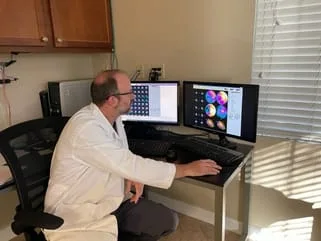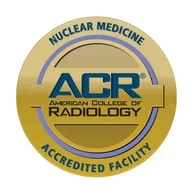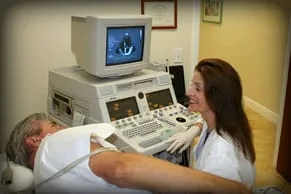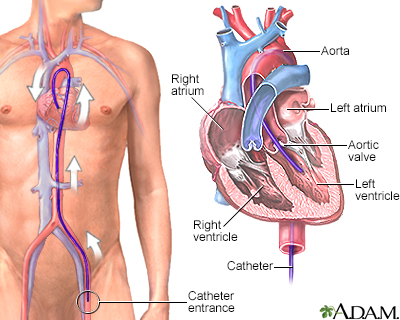At Central Florida Heart Associates, our cardiology services cover a vast continuum of care, from prevention and early detection to the latest in cardiovascular treatment. To help you understand your options, we've included descriptions of some of our leading services on this page.
Office Services
-
Office Consultations
-
New Patient Consultations (Same Day available)
- Interventional, Cardiomyopathy, Hypertension, Heart Conditions, Heart Failure, Heart Rhythm Conditions, Peripheral Artery Disease & Heart Surgery Evaluations
- Hospital Follow Up Visits
- Established Patient follow ups
- Surgical Clearances (Same Day available)
- EKGs
-
New Patient Consultations (Same Day available)
-
Outpatient Office Services
- INR Clinic
- Specialized labs BNP & BMP
In-Office Testing
- Nuclear Stress Department (Accredited by the American College of Radiology)
- Radionuclide Treadmill and Pharmaceutical Stress Test
- Treadmill EKG Stress Test
- EchoVascular Department: Evaluate, Diagnose & Triage cardiac and peripheral vascular diseases.
- Echocardiogram
- Carotid Doppler Ultrasound
- Peripheral Vascular Studies: Arterial Doppler, Lower Extremity Doppler
- ABIs, AAA imaging & diagnosing
- Heart Failure Services
- CHF visits within 3-7 days of discharge
- In-office Lasix Infusions
- Cardiac Arrhythmia Clinic
- 24-48 hour Holter Monitors
- 7, 14, 30 day Event Monitors
- Loop Recorder Insertions
- Device Clinic-Pacemaker, ICD & Loop Recorder checks & programming remotely & in-person appointments
Hospital
- Heart Catheterization
- Coronary Angioplasty and Stents
- Code Stemi Participation
- Carotid Angiogram
- Peripheral Angiogram
- Laser and orbital atherectomy
- Pacemakers/Defibrillator Insertion
- Transesophageal Echocardiogram
Consultation
A cardiologist consultation is typically requested by your primary physician when he or she determines that you may have a heart or related illness. This may also include situations where you or your regular physician suggests you have a second opinion. A cardiologist is a doctor that specializes in finding, treating and preventing diseases of the heart and blood vessels. The initial consultation often involves a physical examination, a review of patient records and medical history, and possible diagnostic testing. Your cardiologist will help you understand the risks and prevention of heart disease. Providing STAT & Same Day Consults at both hospitals.
Coronary Angioplasty/Stenting
The arteries of the heart (the coronary arteries) can become narrowed and blocked due to buildup of plaque on their inner walls. This narrowing reduces the flow of blood through the artery and over time can result in coronary artery disease and heart attack. Angioplasty may improve symptoms of coronary artery disease, such as angina or shortness of breath. Angioplasty and stent placement procedures are used to open one or more clogged or narrowed heart arteries and improve blood flow to the heart muscle. Angioplasty involves inserting and expanding a small balloon where your artery is clogged to help widen the artery. Once the artery is opened, a small stent is used to support the artery. The goal of angioplasty is to restore adequate blood flow through the affected part of the body. The procedure may be suggested by a physician to relieve angina, stop a heart attack, or improve heart function.
Peripheral Angiogram
A peripheral angiogram is a test that uses X-rays and contrast dye to help your doctor find narrowed or blocked areas in one or more of the arteries that supply blood to your legs, feet, or in some cases, your arms and hands. The test is also called extremity angiography. The peripheral angiogram helps you and your health care professional decide if a surgical procedure is needed to open blocked arteries. Peripheral angioplasty is one such procedure. It uses a balloon catheter to open the blocked artery from the inside. A small wire mesh tube called a stentis usually placed in the artery during angioplasty to help keep it open. Bypass surgery is another procedure. It re-routes blood around the blocked arteries.
Pacemaker Implant
A pacemaker is a small device that is placed under the skin of your chest or abdomen to help control a heart that beats too slowly or has any type of abnormal rhythm. This battery-powered device delivers electrical pulses to prompt the heart muscle to beat at a normal rate, which can be life-saving. Pacemakers can be used to treat many conditions with irregular heart rhythms, including congestive heart failure and cardiomyopathy. This may be recommended either after a life-threatening event, or more commonly as a preventative measure in patients who are at high risk for serious heart complications.
Defibrillator Implant
People with severe heart failure or serious arrhythmias (irregular heartbeats) may be candidates for defibrillator implants. These devices are surgically placed under the skin of the chest to monitor the electrical activity of the heart. When a life-threatening abnormal rhythm is detected, small electric shocks are delivered to the heart to return it to a normal heart rhythm, which can be life-saving. Candidates for implantable defibrillators include patients who have serious episodes of abnormal heart rhythm and patients who are at risk for heart attack or have had a heart attack.



